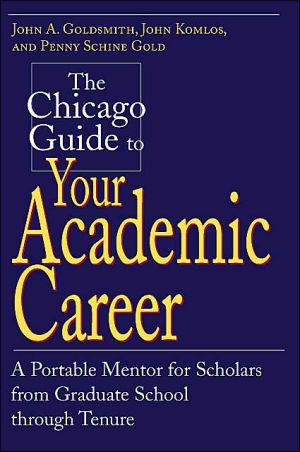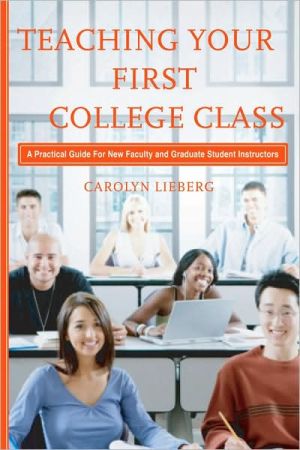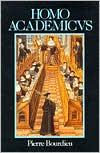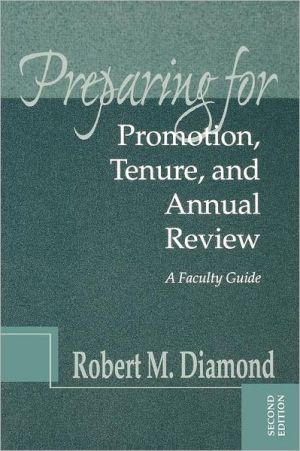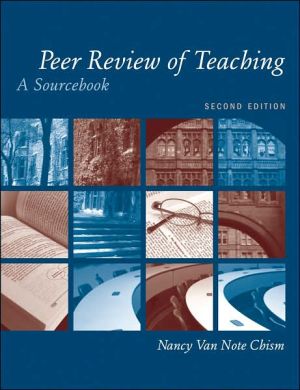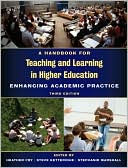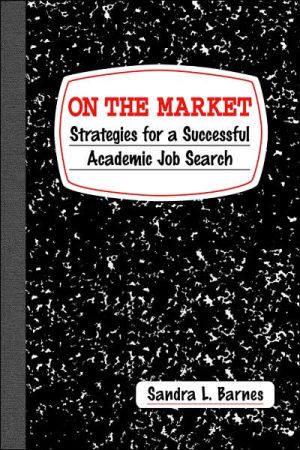Chicago Guide to Your Academic Career: A Portable Mentor for Scholars from Graduate School Through Tenure
Is a career as a professor the right choice for you? If you are a graduate student, how can you clear the hurdles successfully and position yourself for academic employment? What's the best way to prepare for a job interview, and how can you maximize your chances of landing a job that suits you? What happens if you don't receive an offer? How does the tenure process work, and how do faculty members cope with the multiple and conflicting day-to-day demands?\ With a perpetually tight job market...
Search in google:
Three scholars in the humanities and social sciences share reflections on their own professional experiences in academia, including the advantages and disadvantages of pursuing an academic career. They provide insights into finding a mentor, surviving the dissertation process, getting a job, obtaining tenure, publishing, consulting, intellectual property, and opportunities for academics in the corporate world, as well as issues of family, gender and the personal side of academic life. Written as an informal conversation between the three authors, this text is intended for both those considering a career in academia, as well as those already in the early stages of such a career. Annotation © Book News, Inc., Portland, OR
\ The Chicago Guide to Your Academic Career\ \ \ \ A Portable Mentor for Scholars from Graduate School through Tenure\ \ \ \ By John A. Goldsmith, John Komlos, and Penny Schine Gold\ \ \ University of Chicago Press\ \ \ Copyright © 2003\ \ \ University of Chicago\ All right reserved.\ \ ISBN: 0-226-30151-6\ \ \ \ \ \ Chapter One\ \ \ Entering Graduate School\ What is graduate school really all about?\ John Goldsmith: I would say that the most important fact to bear in mind\ is that, in general, the purposes of graduate school and of undergraduate\ studies could hardly be more different. A college education-in the United\ States, at least-is aimed at providing a general education, a liberal\ education, even if the choice of a major subject does allow some degree of\ specialization. In contrast, graduate education is aimed at creating a\ professional. When I use the term "professional," of course, I am not\ using it in the most familiar way. The term is generally used in relation\ to disciplines such as law, medicine, and business. The schools in these\ disciplines provide specific training along what are generally well\ established lines, bringing the student to the point where she may, in\ most of the cases, pass a standardized examination, such as the bar exam\ or the medical boards. The professional schools do not requirestudents to\ write a dissertation or engage in individual research efforts-those\ hallmarks of graduate education in a research university.\ Yet it is still true that graduate education is aimed at forming a\ particular type of professional: a professional researcher. There are some\ important things to say about this. The most significant of all is that\ this kind of intellectual formation has relatively little to do with\ passing on specific information. Oh, it is true that all educators make\ similar claims: they are not teaching specific things, but rather how to\ learn; still, this is nowhere as clear as in graduate school. Alas, the\ graduate research environment is not structured so as to be the training\ ground for the most extraordinary minds either. There are too few of them\ to justify (or help shape, for that matter) the enormous institutions that\ we are talking about. No, graduate education is about training graduate\ students to become researchers (and to some extent, teachers) in a\ research environment, within a specific intellectual tradition.\ Psychologists create new psychologists; linguists create new linguists;\ musicologists create new musicologists.\ Penny Gold: Let me give an example of what we mean by "professional\ training." In my very first term of graduate school, I registered for a\ course called "Medieval Biography." I was happily anticipating learning\ about a variety of medieval people, their lives, and their thoughts.\ Instead, each student picked one medieval author and then tracked all\ existing manuscripts and published editions of this person's work. I chose\ Einhard, the ninth-century biographer of Charlemagne, and spent hours and\ hours in the stacks of the Stanford and Berkeley libraries, pulling down\ very dusty volumes that catalogued manuscript collections across Europe\ and using various bibliographical tools to find all existing editions.\ (Some of this would be easier now because of computers.) I found this\ enormously tedious and complained throughout the term. I wanted to be\ learning about Einhard and Charlemagne, not about his manuscripts! By the\ time I began my dissertation research a couple of years later, I finally\ appreciated the research skills I had developed in this course. Another\ example was a graduate colloquium in "Renaissance and Reformation\ History," in which the entire reading list was recent scholarship, with\ not one primary source text from the period itself.\ This relates to the issue of what is being taught in graduate school. It\ is certainly true that the foundation of graduate training is training in\ a method of analysis, whether that be historical, linguistic, economic, or\ some other method. Yet there is also a great deal of specific information\ that must be learned, as one is expected to very rapidly become\ knowledgeable about "what is being done in the field"-hence, the focus on\ reading the scholarship of others in many graduate school courses. It is\ also such stuff (masses of it) that one is tested on in the oral or\ qualifying examinations that are the gateway to beginning on one's own\ doctoral research. In fact, one of the challenges of life after graduate\ school is to keep on top of the ever-changing scholarship in one's field\ when one doesn't have the concentrated time to do this that one does in\ graduate school.\ John Komlos: While undergraduate education concentrates, in the main, on\ learning a body of knowledge in a wide range of fields, graduate school is\ essentially about exploring the frontiers of knowledge in a particular\ field. Hence, the latter is an extension of the former, but differs from\ it greatly. Being on the frontiers of scholarship (like its geographic\ counterpart in early American history) is not always a comfortable\ experience. There are no guideposts to tell you which path to take.\ \ Can you offer any advice for the person who is seriously thinking about\ entering graduate school?\ John Komlos: Yes, indeed. A very good rule is that you should be excited\ about the field you choose. This is most important! Do you really want to\ find out how the economy or society works? Are you curious about Stone Age\ cultures? Are you really deeply interested in the questions economists or\ sociologists or anthropologists are asking and the answers they are\ supplying? If not, you should seriously question whether these are the\ right career paths for you. By the time you contemplate entering graduate\ school, you should have your goals well sorted out. The American\ undergraduate education allows, even encourages, a great deal of searching\ by trial and error. Flexibility is its strength, but at the same time, it\ places an immense amount of responsibility on the individual student to\ build a program that makes sense in terms of her intellectual development.\ By the end of your undergraduate education, you should have a good idea of\ what you want out of life. Is academia attractive to you? If you are still\ unsure, you must talk to people whom you respect and whose judgment you\ trust as much as, or more than, your own.\ Bear in mind also that genuine introspection helps a great deal. However,\ as long as you feel uncertain, you should delay making a commitment.\ Premature decisions often mean excessive risk taking, and the chances are\ high that you will not be making optimal use of your time or talents. The\ point is that graduate school is much too challenging an experience for\ you to go through if your interest in the subject is merely peripheral.\ Halfhearted commitments won't work out very well. You have to find the\ field of your choice stimulating in order to come out of the process\ unscathed. Otherwise, the chances are good that you will be frustrated and\ disappointed.\ If you have not done well academically, it would be foolhardy to think\ seriously about continuing in graduate school. If you are making plans to\ enter a graduate program, you should prepare yourself well in advance in\ the basic prerequisites of the specialization you have chosen. If you want\ to be an economist, for example, make sure that you have the needed\ mathematical background. Obviously, the sooner you decide, the sooner you\ can start working on the subjects that will be important to you in\ graduate school. It would be very helpful if you spent some time working\ for a professor in the field you are considering. As an undergraduate\ research assistant, you can begin to learn what the field looks like from\ within.\ John Goldsmith: I'd like to second that. Oddly enough, students who are\ considering entering an academic profession often have little idea of what\ they're getting into. In most cases, they are coming straight out of\ college, where they were able to take college-level courses in some areas\ and do some additional reading in other areas. They as likely as not had\ no real contact with faculty researchers and as likely as not did not\ attend a university with any significant number of researchers. In a few\ cases, they may even choose a graduate specialization entirely on the\ basis of reading, never having taken a single course in that area. This is\ true, for example, in my area, linguistics, where students often come from\ language or psychology backgrounds.\ And yet, as John said, a most important precondition for a graduate\ education to work out well is that the student must love the discipline.\ How do you know if this describes you? Utterly reliable criteria are hard\ to establish, but I'd look for a deep and enduring interest in and\ fascination for the subject, the profession, and its literature. It is\ surprising how often this condition is not met! Students may (so to speak)\ wander into graduate school in a specific discipline, take a year or two\ of courses (or more), and not be at all sure of the correctness of their\ choice. Still, inertia, the time and money invested, and the fear of\ losing face all push the students on, often propelling them to the point\ of writing a dissertation, or even beyond.\ Yet as the student moves further along in the education process, she will\ find that there is less and less personal support and that the hurdles\ rise higher and higher, with longer periods between moments of reward and\ relaxation. (This trend continues, of course, when the student moves into\ faculty status.) Without a strong emotional attachment to the field-simply\ feeling fascinated by what one is doing-this difficult task becomes no\ more than a long-term commitment to masochism. Loving the field means that\ the hard work is its own reward.\ John Komlos: Moreover, I would suggest that the student seek advice, again\ and again.\ Penny Gold: I'd like to interject here some advice about advice-who and\ what to ask:\ To professors who know your work well: Do you think graduate school, in\ this particular field, would be a good choice, given my level and kinds\ of talents? Do you think I would have a contribution to make?\ To professors in your field who have completed graduate school within\ the last five years or so: What are the current issues in the field?\ Where do you see the field going? What is graduate school like these\ days?\ To these and any other professors whom you admire or whom you might\ aspire to be like: Are you glad you became a professor? What are the\ best things about life in academia? What are the most difficult or\ troubling things?\ To graduates of your own college or university who are now in graduate\ school in a field close to yours or who have recently obtained jobs\ (your undergraduate teachers, the Career/Placement Center, and/or the\ alumni office should be able to give you names and addresses): How have\ you found the graduate school experience? Did you find that you were\ well prepared for the program you entered? Is there any advice you wish\ you'd had before entering graduate school?\ John Komlos: As with any other important decision, you should continually\ question and rethink this one as well. After all, it will have an enormous\ (and generally irreversible) impact on the rest of your life. By making\ this choice, you have in many respects chosen a lifestyle. If you're\ entering graduate school, you are about to invest several years of intense\ effort, often resulting in a considerable financial burden. So it behooves\ you to take the decision very, very seriously. New information may become\ available that might be put into the decision-making equation. Did you\ make the right choice after all? Are you as prepared for graduate school\ as you had thought you were? Do you still find the field as exciting as\ before? Do you actually have the skills, intuition, and talent you thought\ you had? If you can identify some marked deficiencies, how long would it\ take to overcome them? For example, how long will it take you to learn\ another language? Do you write well? Depending on the rigors of your\ education so far, you may still not have perfected the art of written\ communication, even in your native language. You can teach yourself, of\ course, but it is best done before you enter graduate school. Obviously,\ the sooner you sort out these issues the better.\ You might also consider if your motivations are sound. What are the\ rewards in the field you are considering? What is the ratio of pecuniary\ to nonpecuniary rewards you can expect? Is that mix about right for you?\ Try to avoid establishing potentially conflicting goals, such as rising to\ the upper end of the academic salary range while teaching in the\ humanities. Original research requires much self-reliance, perseverance,\ and intelligence as well as creativity. You also need self-discipline to\ complete the monotonous tasks that inevitably accompany even the most\ exciting research project. Do you have enough of these qualities to\ succeed?\ Self-questioning is, of course, an important quality to nurture in\ yourself, but it certainly requires practice to be effective. One cannot\ develop such critical skills overnight. Do you know yourself well enough?\ Are you practicing self-deception without even knowing it? Are you able to\ judge yourself without making excuses? Do you rationalize your mistakes,\ so you cannot learn from them? You can improve your forecasts about\ yourself by consciously updating your information set periodically. How\ have you erred in the past, and what can you learn from these errors about\ your true abilities and about your expectations? Are the goals you are\ about to set for yourself reasonable in light of your past performance?\ Are you getting closer to formulating a reasonable strategy for solving\ problems?\ If, for example, you have a tendency to start projects without finishing\ them, it is much better to acknowledge this attribute than to make excuses\ about why this is the case and externalizing blame. Disregarding that\ trait in yourself is a big mistake, one that may cost you dearly later.\ How can you use that information to predict your ability to succeed in a\ Ph.D. program? First, take that information into account, and then work on\ improving your predictive ability by searching for answers as to why your\ actions fall into a particular pattern and just how these mistakes are\ changeable. Just what is it that makes it so difficult for you to complete\ a project? Once you are able to finish some tasks ahead of schedule, you\ can be more certain that, with some probability, you can actually complete\ a particular goal you set for yourself in the allotted time. In other\ words, you should not be making systematic errors about your abilities or\ about your performance. If your mistakes are systematic, the chances are\ you are disregarding some significant information available to you.\ I'll make this point yet another way because I think it is crucial for\ success. I believe that mistakes are OK, in general.\ \ Continues...\ \ \ \ \ \ \ Excerpted from The Chicago Guide to Your Academic Career\ by John A. Goldsmith, John Komlos, and Penny Schine Gold\ Copyright © 2003\ by University of Chicago.\ Excerpted by permission.\ All rights reserved. No part of this excerpt may be reproduced or reprinted without permission in writing from the publisher.\ Excerpts are provided by Dial-A-Book Inc. solely for the personal use of visitors to this web site.\ \ \
PrefaceAcknowledgments1Deciding on an Academic Career32Entering Graduate School18The Inside Track: Financing Graduate Education303The Mentor444Writing a Dissertation545Landing an Academic Job66The Inside Track: Leaving Academia for the Corporate World1266The Life of the Assistant Professor1357Teaching and Research161The Inside Track: Publishing the First Book2058Tenure2109Competition in the University System and Outside Offers225The Inside Track: Consulting and Intellectual Property23410Family, Gender, and the Personal Side of Academic Life23611Conclusion252App. 1: The Administrative Structure of a University257App. 2: Policies on Parental Leave and Shared Positions266App. 3: Tables272Notes277Bibliography295About the Authors301Index303
